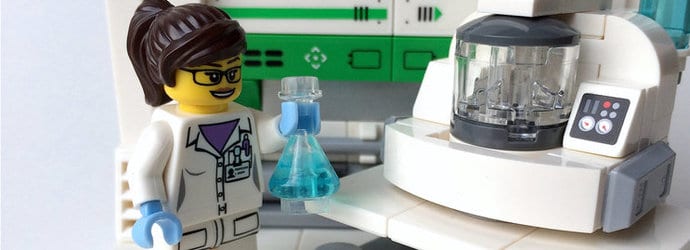Working in a research lab is not a normal job. The hours are often unconventional and the tasks can run from exciting to mundane—it’s a world all of its own. Even so, your loyalty to your field and people is unmatched; there is a level of comradery you experience that is unlike any other. This is why leaving the lab is, in many cases, so difficult.
Whether it’s a higher paying job, a complete career change, or family obligations, leaving the comfort and familiarity of projects and your “lab family” can be a frightening venture. But other people have succeeded in taking the plunge, and so can you!
Here’s your step-by-step guide on how to leave the lab with all relationships and sanity intact:
1. Be Honest with Your Boss
First and foremost, you have to be upfront with your PI. If you are considering changes in your career that don’t include the lab, then you need to have a sit down.
The lab is essentially a company and your PI needs to keep things moving along in your absence (i.e., hiring replacements). We all know how long the hiring process can be, so waiting until the last minute to mention your likely departure is not only rude, but also it can leave a bad taste in your PI’s mouth. Be mindful of the investment your PI made in you and return the favor. Need even more incentive? Going about the separation process in a responsible manner can lead to positive references from your boss—always a win!
2. Set Reasonable Timelines
A career in a lab is not the same as most “civilian” jobs, especially when it comes to hours. More often than not, we are invested in long-term experiments that can take weeks, months, or even years to complete once started. While most jobs accept a standard “two-weeks notice”, doing that in the lab will get you nothing but stink-eye and likely burn any bridges you may have forged.
Your transition out will take some time, so plan accordingly. A few months should be more than enough time to finish any items/experiments/papers on your priority list, but this will obviously depend on your projects and any impending deadlines. So, talk with your PI about what is reasonable not only for your exit timeline, but what your deliverables will be by the time you walk out of the door.
3. Think about Your Skills and Ask What You Can Do to Help the Lab Transition
Chances are that in addition to your winning personality, you were hired because of your expert knowledge in some area. That’s wonderful! However, now that you’re leaving, you need to be sure that your tricks of the trade are passed along. Secrets don’t make friends, especially when it comes to lab techniques and protocols.
Moreover, it is possible that there are small “household” chores that you attend to that no one else does (think: making a particular reagent, ensuring a specific antibody is always in stock). Be sure that you pass these task-torches to someone else. It’s all about setting up your left-behind labmates for success!
4. Be Organized
This is my biggest pet-peeve in the lab. In some way or another, we’ve all been second or third (or more…) in line of a project where the person before made no effort to organize notes, data, or freezer samples. It is the WORST. Don’t be that person!
Spend extra time making sure that everything, and I do mean EVERYTHING, that you leave behind is interpretable: notes make sense, data and samples can easily be found, conclusions are available. In short, make your high school science teacher proud with your mad note-booking skills.
5. Clean All of Your Stuff Out
Don’t be gross: clean up after yourself. This is equivalent to sharing an apartment, moving out, and leaving your nasty sour milk in the fridge. Just don’t. In the lab, this goes for everything: personal reagents, cell lines currently in culture, freezer samples that you thought you would need but didn’t… it ALL gets cleaned out. This includes your desk space and office drawers. Purge away.
6. Be Available
As hard as you may try, not all of your data or protocols are going to be crystal clear when you leave. So be considerate to your lovely labmates and be available. Answer questions and look back over data with the aura of a saint.
Bottom-line: Be considerate. You are a cog in a larger wheel, so people depend on you in some capacity. Ensuring that your transition is as smooth as possible not only helps out the people you leave behind, but provides you with the confidence to move forward on your next adventure.
Are there any other tips that helped you when leaving the lab? Comment below!






